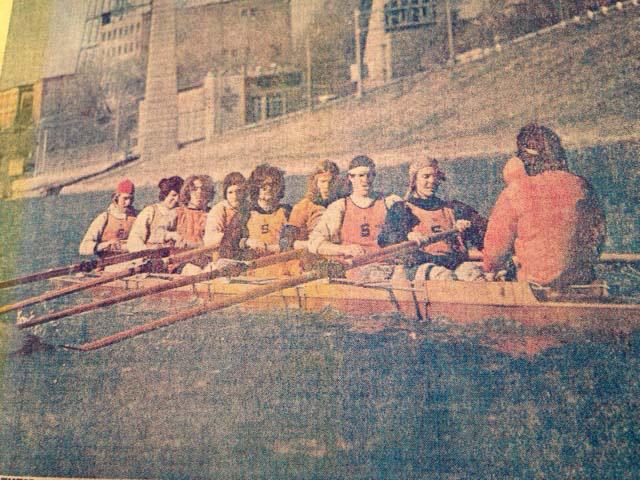Former Buff State rower to coach Olympic boat
Scott Roop (third from the back of the boat) is a former Vesper Cup winner and USA Rowing Hall of Famer. He began his rowing career at Buffalo State in 1974.
May 4, 2016
This summer, head coach Scott Roop and his lightweight rowing team out of Cambridge Boat Club of Cambridge, Massachusetts will represent the United States in the Summer Olympics in Rio De Janeiro, Brazil.
Roop, a 1979 Buffalo State alum, began his illustrious rowing career at Buffalo State as a walk-on in 1974. A member of the wrestling team from 1972-74, he had the perfect build – tall and lean – to be an asset to the team. Jim Schaab, head coach of Buffalo State’s rowing team from 1963-74, recognized that right away.
“He was a self-motivated young man in tremendous shape,” Schaab said. “He didn’t like to take second place and strove to be the best man he could possibly be.”
Roop rarely settled for second in his time at Buffalo State. At a lanky 6 feet and 155 pounds, he had the perfect lean build to be a prolific lightweight rower. He was part of the 1974 Buffalo State rowing team which won the New York State Small College Championship.
Roop fell in love with the sport of rowing at Buffalo State. Schaab and Roop’s teammates recalled a young man obsessed with perfecting his technique, training to the point of exhaustion and never making excuses.
He and his teammates had plenty of opportunity to make excuses. With no indoor facilities and relying entirely on the unpredictable seasonality of Lake Erie, the team often had a very short period of time in which they could train on the water – often just several weeks in comparison to the several months that east coast teams from the New York City area had.
“We have this problem called Lake Erie. It freezes over,” said Schaab. “We often didn’t have a lot of water if we had water at all. We had to rely on our conditioning and work.”
When Lake Erie was frozen over, the team would go to the former Buffalo Memorial Auditorium, which was demolished in 2009, and send echoes of rubber sneaker soles thrashing against cement stairways screeching through the empty arena as they ran up and down the aisles 30 times.
Dr. Gary Nelson, a member of the 1974 Buffalo State rowing team, recalls running with the team from Buffalo State to the west side and back. Most of the team returned exhausted. When Roop returned, he went for a five-mile jog to cool down.
“That guy was a dickens of a trainer,” said Nelson, now a general practitioner at Southtowns Internal Medicine in Orchard Park, NY. “That guy was a maniac. We were running a lot, more than the track team. And Scott did more than the rest of us. He was dedicated and over the top in that way.”
On top of a short outdoor training season, Buffalo State, like all state schools, had a limited budget to allocate to its sport teams – and rowing was, of course, the last team to get its share of the athletics budget.
Schaab recalls the 1974 trip to New York City for the New York State Small School Championships, at which Buffalo State, an underdog, took first place despite competing against many private colleges with indoor training facilities.
“When we got there, we slept on the boathouse floor because we didn’t have any money,” Schaab said. “We traveled with orange juice and peanut butter and jelly sandwiches.”
Buffalo State realized great success because of discipline, conditioning and incredible drive.
“They worked extra hard and wanted to compete,” Schaab said. “We won a lot of races because our conditioning carried us to the end. We won a lot of races coming from behind.”
In 1974, the United States was fighting the Vietnam War. Ideologies of a younger, more liberal generation of which an overwhelming majority protested the war and an older, more conservative generation clashed. Schaab felt that many of the young men on his team escaped from constant college protests and political unrest in rowing and in the brotherhood which arose between the teammates.
“The Vietnam War created a lot of controversy,” Schaab said. “These kids had a lot of newfound freedom which a lot of them couldn’t handle. For a lot of these kids, it was their first time away from momma and papa. The biggest challenge was to have these kids set goals.”
Tom Conley, also a member of the 1974 Buffalo State rowing team, defined the relationship he had with the team as a “band of brothers.”
“Rowing was a plus in all of our lives,” he said. “It was a defining moment. Scott took it farther than anyone else did.”
Roop first took the oar at Buffalo State in 1973. He’s since taken the opportunity the sport provided him and rowed with it. After graduating from Buffalo State in 1979, Roop continued training at the Westside Rowing Club.
In 1981, Roop took first place in the single scull – an individual event – at the World Championships in Munich, Germany, won the Vesper Cup and was named the Most Outstanding Person or Crew in USA Rowing that year for his efforts. Over his career, he has eight other medals in the eight, double and single-scull events from national and international competitions.
Roop began his coaching career as the interim head coach at Princeton University in 1990. In 1991, he took a job as the head coach of the women’s rowing team at Temple University. Roop joined the Brown coaching staff in 1992 as the head coach of the freshman team. His teams went undefeated for three straight seasons in intercollegiate competition. In 1994, he was named head coach and led the team to their third consecutive National Collegiate Rowing Championship title. He stepped down as head coach at Brown in August of 2001.
He was inducted into the United States Rowing Hall of Fame in 1992. 14 years later, in 2006, his career came full circle when he was named to the Buffalo State Athletics Hall of Fame. Schaab’s induction came two years later in 2008.
The man who taught him the sport, Jim Schaab, has kept in touch with Roop throughout his career. The two go out to dinner when Roop comes to town, exchange family Christmas cards and email back and forth regularly.
“Like I said to the kids when they won states – I said, ‘We’ve got to go to nationals; we’ve got bigger fish to fry,’” Schaab told Roop when he heard the news that he’d be coaching his team in Rio. “And what I meant by that – he knew exactly what I meant – for three years they set a goal to win the Olympic trials, and they did. Now their goal is to win the Olympics. You can’t ever let down.”
email: [email protected]






Bruce Dennison • Aug 1, 2016 at 7:53 pm
Scott was on the high school wrestling team with me at Central Square, NY. Same age. Some guys develop later, and Scott was still one of our lightweights in our senior year. Well, he developed and grew in college. He called me a couple of months ago, and we caught up a little. At the time, he was still qualifying his team for these Olympics. What an experience, and we all can’t wait to hear about it when we see him again. Couldn’t be prouder of our classmate. Heart beats talent.
Jim schaab • May 5, 2016 at 7:44 am
Very nice article.
There are 2 chances that should be made for accuracy.
The crew that won the lightweight Olympic trials rowed out of Cambridge boat club.
In 1981 Scott Roop won the world championships not me